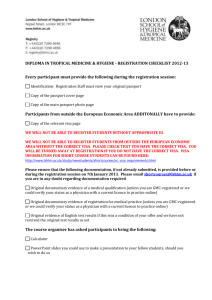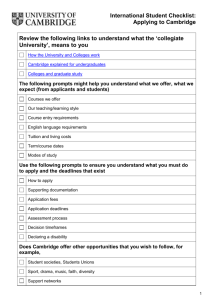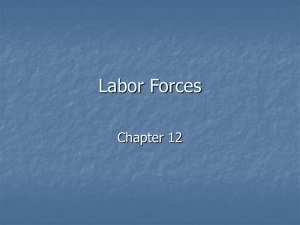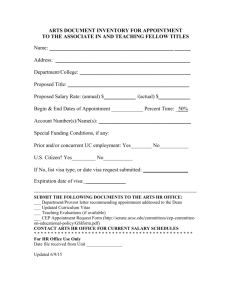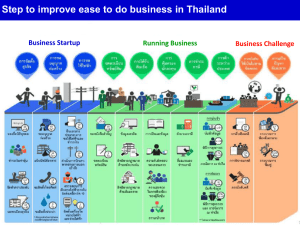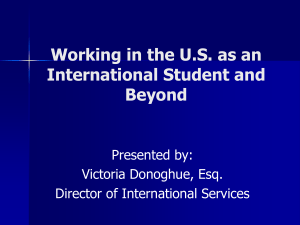MEDICAL UNIVERSITY OF OHIO
advertisement
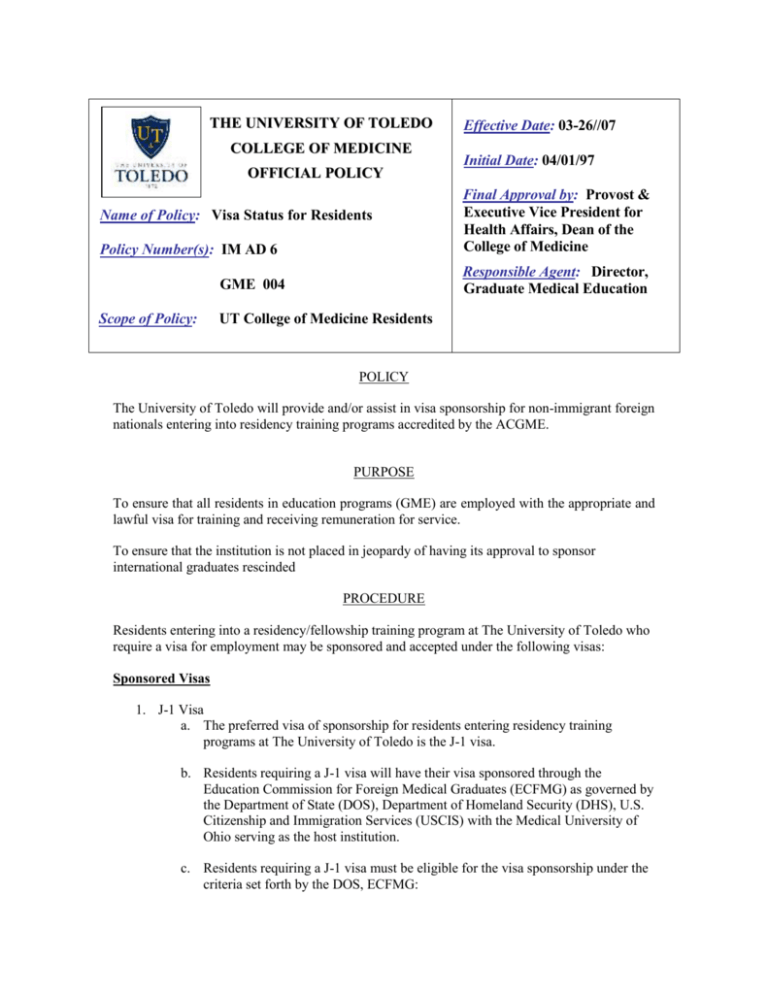
THE UNIVERSITY OF TOLEDO COLLEGE OF MEDICINE OFFICIAL POLICY Name of Policy: Visa Status for Residents Policy Number(s): IM AD 6 Initial Date: 04/01/97 Final Approval by: Provost & Executive Vice President for Health Affairs, Dean of the College of Medicine Responsible Agent: Director, Graduate Medical Education GME 004 Scope of Policy: Effective Date: 03-26//07 UT College of Medicine Residents POLICY The University of Toledo will provide and/or assist in visa sponsorship for non-immigrant foreign nationals entering into residency training programs accredited by the ACGME. PURPOSE To ensure that all residents in education programs (GME) are employed with the appropriate and lawful visa for training and receiving remuneration for service. To ensure that the institution is not placed in jeopardy of having its approval to sponsor international graduates rescinded PROCEDURE Residents entering into a residency/fellowship training program at The University of Toledo who require a visa for employment may be sponsored and accepted under the following visas: Sponsored Visas 1. J-1 Visa a. The preferred visa of sponsorship for residents entering residency training programs at The University of Toledo is the J-1 visa. b. Residents requiring a J-1 visa will have their visa sponsored through the Education Commission for Foreign Medical Graduates (ECFMG) as governed by the Department of State (DOS), Department of Homeland Security (DHS), U.S. Citizenship and Immigration Services (USCIS) with the Medical University of Ohio serving as the host institution. c. Residents requiring a J-1 visa must be eligible for the visa sponsorship under the criteria set forth by the DOS, ECFMG: i. Possess a valid ECFMG Certificate. The current requirements for ECFMG certification include passing Step 1, Step 2 CK, and Step 2 CS of the USMLE and direct verification of the applicant’s medical education credentials with the medical school. ii. A contract or offer letter from the GME program affiliated with a medical school. iii. A Statement of Need from the Ministry of Health of the physician’s country of most recent legal permanent residence. d. Residents requiring a J-1 visa will be responsible for the initial visa expenses and renewal expenses thereafter as set by the ECFMG. e. It is J-1 visa holder’s (resident) personal responsibility to maintain lawful status while in the United States and under contract in the residency training program. Lawful status is evidenced by possession of an active SEVIS record along with the corresponding DS2019 Form and I-94 Record (Arrival/Departure Record) or I-797 Form (Notice of Action). f. Residents on a J-1 visa are not permitted to moonlight. 2. H-1b Visa a. Residents may be eligible to enter a residency training program at The University of Toledo, at the training program’s discretion, on an H-1b visa under the following circumstances: i. Resident was a medical student at a LCME medical school on an F-1 visa, and may apply for the Optional Practical Training year then an H1b visa thereafter. ii. Resident is currently on an H-1b visa at another institution and transferring into a training program at The University of Toledo. iii. At the request of the training program with the approval of the GME office based upon exceptional circumstances and evidence of excellence, which may include but not limited to USMLE scores, previous US experience, research experience, etc. The University of Toledo and residency training programs maintain the right to limit the number of H-1b visas offered based upon the criteria set forth by the institution/training program. Each residency program offering H-1b visas will be required to have written criteria outlining the minimum standards used in determining which candidates will be eligible for an H-1b visa. b. Residents requiring an H-1b visa will have their visa sponsored by The University of Toledo. The H-1b visa is employer-specific and the holder (resident) of the H-1b visa may only work in the specific position at the specific location(s) outlined in the employer’s Labor of Condition Act (LCA) petition. Therefore, any resident considering moonlighting on an H-1b visa must apply for a separate LCA with the institution/location where the resident will be employed for moonlighting. In addition, the resident must follow criteria set forth in the GME Moonlighting policy HSC-COM-09-018-00. c. Residents requiring an H-1b visa must be eligible for the visa under the criteria set forth by the U.S. Department of Labor (DOL), USCIS, and DHS: i. Possess a valid ECFMG Certificate. The current requirements for ECFMG certification include passing Step 1, Step 2 CK, and Step 2 CS of the USMLE and direct verification of the applicant’s medical education credentials with the medical school. ii. Successful passing of USMLE Step 3 by date of rank order list certification. iii. A contract or offer letter from the GME program affiliated with a medical school. iv. A valid temporary training certificate or permanent license issued by the State Medical Board of Ohio. The temporary training certificate must be issued as a final step in the H-1b visa process for approval during the LCA petition process. d. Residents requiring an H-1b visa will be responsible for the following initial visa expenses and renewal expenses: i. Lawyer/Immigration Specialist fees ii. Premium processing fees (currently $1,500) Residents requiring an H-1b visa will be required to use the lawyer/immigration specialist designated by The University of Toledo. The University of Toledo will be responsible for the following initial visa expenses and renewal expenses: i. H-1b visa institution filing fee (currently $190) ii. Initial DHS Fraud Prevention and Detection fee (currently $500) iii. Additional filing fee expenses for renewals e. It is H-1b visa holder’s (resident) personal responsibility to maintain lawful status while in the United States and under contract in the residency training program. Lawful status is evidenced by possession of a valid I-94 Record (Arrival/Departure Record) or I-797 Form (Notice of Action). Non-Sponsored Visas The following visas are acceptable for employment for those residents entering into residency/fellowship training programs at The University of Toledo who do not require a sponsored visa: 1. Employment Authorization Document (EAD) 2. Optional Practical Training (OPT) with a valid EAD card 3. Trade NAFTA (TN) a. Only residents accepted into the Dentistry residency program may be eligible for this visa if they are a citizen of Canada or Mexico. 4. Asylee/Asylum Status a. Must possess a Social Security Card deeming resident eligible for employment. 5. Lawful Permanent Resident (Green Card) 6. Naturalized U.S. Citizen The University of Toledo does not sponsor residents for Permanent Residency. Regardless of visa or citizenship status, a candidate who has graduated from a non-LCME medical school must posses a valid ECFMG certificate in order to participate in a residency training program at The University of Toledo. Chairman ,Department of Medicine _________________________ Program Director _______________________________ 3/28/2007 Policy HSC-COM-09-004-00 Appendix COMPARISON OF H-1B AND J-1 VISAS H-1b Visa Designed to permit temporary employment in the U.S. of non-immigrants J-1 Visa Designed to enhance understanding between the people of the U.S. and the people of other countries through educational and cultural exchanges Responsible Organizations U.S. Department of Labor (DOL); U.S. Citizenship and Immigration Services (USCIS); U.S. Department of Homeland Security (DHS) U.S. Department of State (DOS); DHS; USCIS; Education Commission for Foreign Medical Graduates (ECFMG) Processing Time 12-16 weeks process and approve petition; 2 weeks for premium processing 6-8 week to process application USMLE Pass USMLE 1, 2CK and 2CS, and 3 (or equivalent exam) Pass USMLE Steps 1, 2CK and 2CS, (or equivalent exams) Limits Six years (not related to length of training) Progressive training in approved GME program for a maximum of seven years Funding Funding is from the US employer in the form of salary compensation Funding can be from a variety of sources; training stipend, funds from private and governmental entity in the home country, etc. Home Country Physical Presence Requirement No home country physical presence requirement 2 year home country physical presence requirement. Waivers are available for service in the U.S. underserved areas Spouse or Child The H-4 spouse or child of an H-1b is not permitted to work while in H-4 status The J-2 spouse or dependent child can apply for employment authorization Design Purpose

